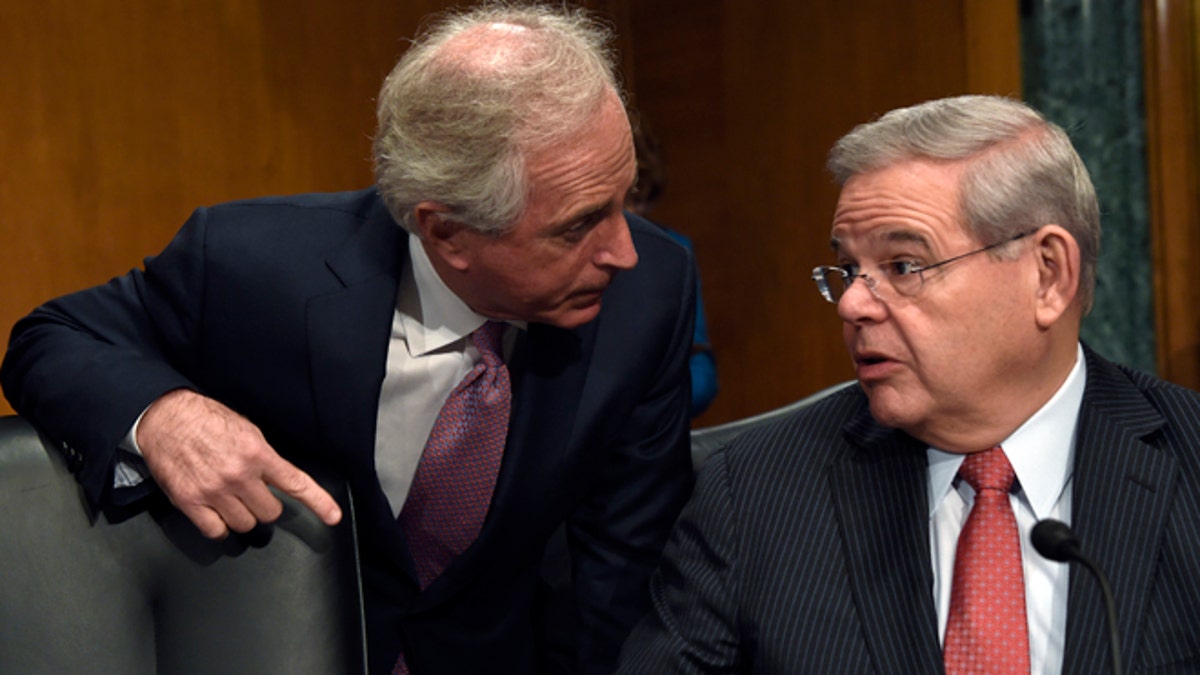
FILE - In this Jan. 27, 2015 file photo, Sen. Robert Menendez, D-N.J., right, and Sen. Bob Corker, R-Tenn. talk on Capitol Hill in Washington. A bipartisan bill in the Senate would set up a nonprofit foundation to help eliminate forced labor and sexual servitude around the world. The Senate Foreign Relations Committee is to vote Thursday on the bill introduced by chairman Sen. Bob Corker, R-Tenn., and Robert Menendez, D-N.J., the ranking Democrat on the committee. (AP Photo/Susan Walsh, File)
Washington – Another Senate session, another impasse.
On Tuesday, Democrats prevented legislation designed to help victims of sex trafficking from moving forward because of an amendment regarding abortion that few lawmakers had noticed when the bill was introduced.
The outcome left the fate of the legislation, which was co-sponsored by Bob Menendez (D-N.J.) and Bob Corker (R-Tenn.), uncertain and the president's attorney general nominee, Loretta Lynch, caught in the crossfire. Senate Majority Leader Mitch McConnell has put off Lynch's confirmation vote until the trafficking bill is resolved, provoking howls from Democrats, civil rights leaders and women's groups over what has become a months-long delay to confirm the nation's first black female attorney general.
Sen. Marco Rubio, R-Fla., said he was "inclined not to" vote in favor of Lynch's nomination for attorney general, though he said he had not made a decision. Rubio, a possible presidential candidate, said he was extremely concerned about Lynch's answers on President Barack Obama's executive actions on immigration.
"To have the next attorney general of the United States argue with a straight face that that is legal and constitutional, I think is in the minds of many people and increasingly mine, a disqualifier," Rubio said in an interview with the Associated Press.
Senators of both parties loudly lamented their impasse on the trafficking bill, yet blamed each other in a spectacle of fruitless bickering notable even for Congress.
"Democrats filibustering help for terrified children and abused women would represent a new low," McConnell, R-Ky., said on the Senate floor.
"Republicans have chosen to manufacture a political fight that has nothing to do with human trafficking," Senate Minority Leader Harry Reid, D-Nev., retorted a short while later.
The vote was 55-43 on a procedural motion to move forward on the bill, short of the 60 needed. McConnell said he would bring the bill up again as Republicans try to pressure Democrats to back down and join them. "We're going to stay on this bill," he said.
The bill would create a fund to help victims, and includes measures to make it easier for law enforcement to go after people involved in sex trafficking. It enjoyed wide bipartisan support until early last week, when Democrats began to raise objections over a provision in the bill blocking money in the victims' fund from paying for abortions in most cases.
Even though similar prohibitions have been included in annual spending bills for decades, Democrats claim the language in the trafficking bill goes further. Republicans noted that the provision had been in the bill for weeks as it passed the Judiciary Committee unanimously and picked up Democratic co-sponsors, but Democrats claimed they never noticed it until just before a floor vote was scheduled.
Democrats are calling on Republicans to remove the offending language, which Republicans say they won't do. Republicans say Democrats could lift their objections, allow votes on the bill, and offer an amendment to excise the abortion language. Democrats have turned that offer down because they would lose the amendment vote.
A second amendment linked to the anti-sex trafficking bill is also creating friction between the parties. The other one revisits a long-talked-about, controversial proposal to end so-called "birthright citizenship" for children born in the United States to undocumented immigrants.
The measure seeks to change the law that gives citizenship to anyone born in the country. The amendment would allow citizenship to someone who has an undocumented parent only if the other parent is a U.S. citizen, a legal permanent resident or is an actively-serving member of the armed services.
Next steps are uncertain though lawmakers on both sides said they want to find a way out. Republican Sen. Susan Collins of Maine said talks were happening to try to find a compromise, and she noted that the House version of the bill didn't include the abortion provision.
Still, with the Senate set to turn next week to voting on a budget, and a two-week congressional recess scheduled after that, Lynch's confirmation vote may have to wait until April.
"There may be solutions to trafficking, we are certainly open to exploring them without doing damage to the principles we laid out," said Sen. Chuck Schumer, D-N.Y. "But those are no reason to hold up Loretta Lynch."
Schumer and other Democrats raised concerns Tuesday that the long delay since she was nominated last fall may be putting Lynch's nomination in jeopardy. Previously uncommitted Republicans appear to be breaking against her, with Sen. Bob Corker, R-Tenn., announcing his opposition Tuesday.
Rubio was part of the eight-member bipartisan Senate group that crafted comprehensive immigration legislation that contained a path to citizenship for millions of immigrants. He later distanced himself from the measure.
Several other Republicans remain uncommitted and Lynch commands solid backing from four Republicans, which would be just enough to confirm her with the bare minimum of support.
Based on reporting by the Associated Press.
Like us on Facebook











































